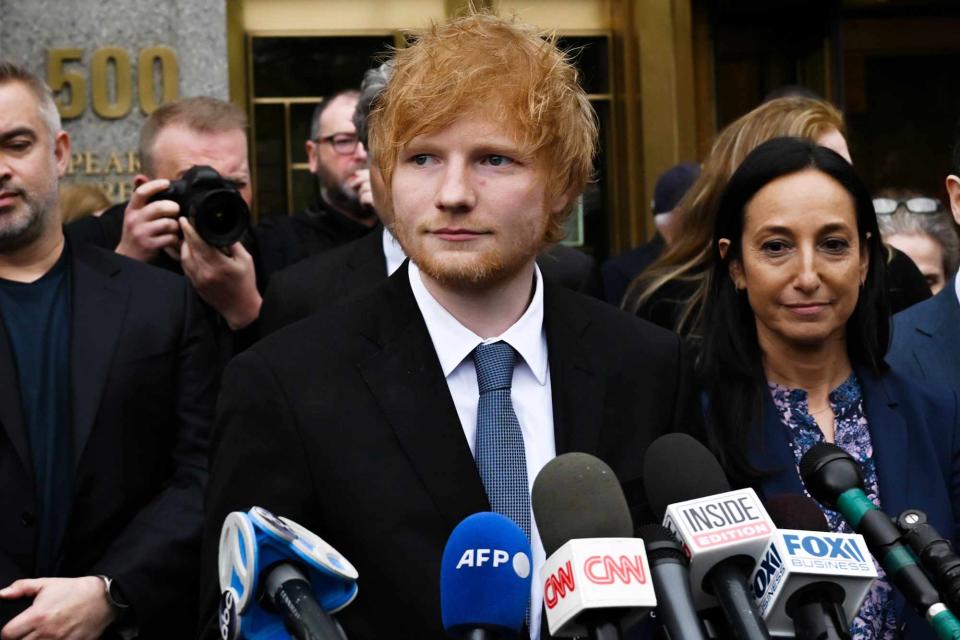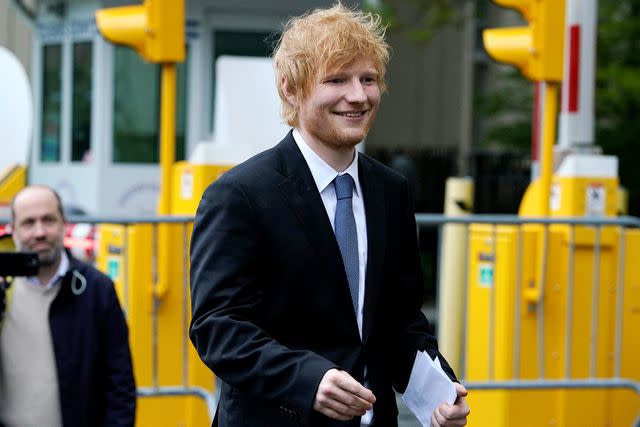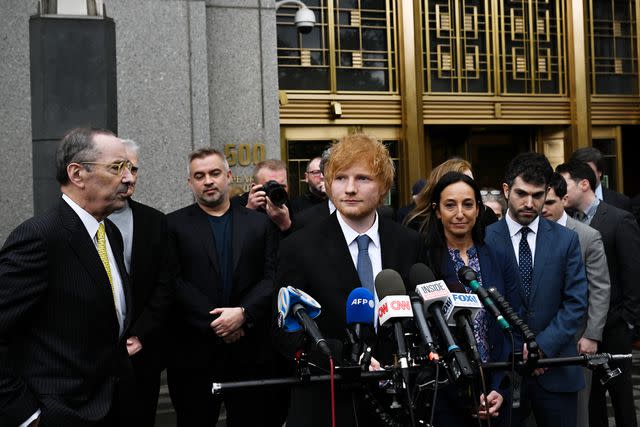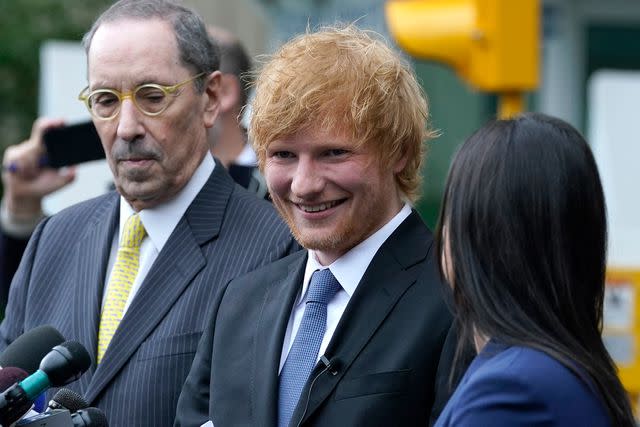Ed Sheeran Found Not Liable in Copyright Lawsuit: 'I Feel the Truth Was Heard and Believed' (Exclusive)
In a jury trial that went for more than a week, Sheeran was accused of lifting direct elements of the Marvin Gaye classic "Let's Get It On" for his Grammy-winning single

A jury has found Ed Sheeran not liable in a lawsuit filed against him for alleged copyright infringement over his 2014 single "Thinking Out Loud."
The unanimous verdict was reached after about three hours of deliberation by seven jurors in a New York City courtroom Thursday.
"I feel like the truth was heard and the truth was believed," Sheeran, 32, told PEOPLE exclusively in the courthouse following the decision. "It's nice that we can both move on with our lives now — it's sad that it had to come to this."
After the verdict was read, the musician hugged his legal team and co-writer Amy Wadge, then approached plaintiff Kathryn Townsend Griffin and the two smiled and talked before exchanging hugs. As he exited the courtroom, Sheeran embraced and kissed wife Cherry Seaborn, who was in attendance.
Related:Ed Sheeran Performs Live in Court to Jury in Copyright Trial, Says He Wrote '10 Songs' This Week

In a jury trial that went for more than a week, Sheeran was accused by Structured Asset Sales of lifting direct elements of the Marvin Gaye classic "Let's Get It On" for his "Thinking Out Loud" single.
Structured purchased a third of the shares of the song from the family of Ed Townsend, who co-wrote "Let's Get It On" with the iconic Gaye, in 2018. His daughter Kathryn Townsend Griffin was one of the plaintiffs in the lawsuit.
In a statement Sheeran read aloud outside the courthouse and distributed to reporters following the verdict, he wrote, "Good afternoon. I am obviously very happy with the outcome of the case, and it looks like I'm not going to have to retire from my day job after all — but, at the same time, I am unbelievably frustrated that baseless claims like this are allowed to go to court at all.
We have spent the last eight years talking about two songs with dramatically different lyrics, melodies and four chords which are also different and used by songwriters every day, all over the world.
These chords are common building blocks which were used to create music long before "Let's Get It On" was written and will be used to make music long after we are all gone. They are a songwriter's 'alphabet', our tool kit and should be there for us all to use. No one owns them or the way they are played, in the same way, nobody owns the colour blue.
Unfortunately, unfounded claims like this one are being fuelled by individuals who are offered as experts in musical analysis. In this instance, the other side's musicologist left out words and notes, presented simple (and different) pitches as melody, creating misleading comparisons and disinformation to find supposed similarities where none exist. They tried to manipulate my and Amy's song to try to convince the jury that they had a genuine claim, and I am very grateful that the jury saw through those attempts. This seems so dangerous to me, both for potential claimants who may be convinced to bring a bogus claim, as well as those songwriters facing them. It is simply wrong. By stopping this practice, we can also properly support genuine music copyright claims so that legitimate claims are rightly heard and resolved.
If the jury had decided this matter the other way, we might as well say goodbye to the creative freedom of songwriters. We need to be able to write our original music and engage in independent creation without worrying at every step of the way that such creativity will be wrongly called into question. Like artists everywhere, Amy and I work hard to independently create songs which are often based around real-life, personal experiences. It is devastating to be accused of stealing other people's songs when we have put so much work into our livelihoods.
I am just a guy with a guitar who loves writing music for people to enjoy. I am not and will never allow myself to be a piggy bank for anyone to shake. Having to be in New York for this trial has meant that I have missed being with my family at my grandmother's funeral in Ireland. I won't get that time back."

He continued, "These trials take a significant toll on everybody involved, including Kathryn Townsend Griffin.
I want to thank the jury for making a decision that will help to protect the creative process of songwriters here in the United States and around the world.
I also want to thank my team who has supported me throughout this difficult process and to all the songwriters, musicians and fans who reached out with messages of support over the last few weeks.
Finally, I want to thank Amy Wadge. Neither of us ever expected that nine years on from our wonderful writing session that we would be here having to defend our integrity. Amy, I feel so lucky to have you in my life.
We need songwriters and the wider musical community to come together to bring back common sense. These claims need to be stopped so that the creative process can carry on, and we can all just go back to making music. At the same time, we absolutely need trusted individuals, real experts who help support the process of protecting copyright. Thank you."
Sheeran took the stand Tuesday and was questioned by his attorney Ilene Farkas. At one point, the Grammy-winning artist was asked what he would do if the court finds "Thinking Out Loud" to be too similar to "Let's Get It On."
"If that happens, I'm done, I'm stopping," Sheeran said.
"I find it to be really insulting," he added. "I work really hard to be where I'm at."

Related:Ed Sheeran Attends The Sum of It All Docuseries Premiere After Day in Court for Copyright Lawsuit
Wadge, Sheeran's co-writer for "Thinking Out Loud" also took the stand Tuesday where she explained to jurors their song's tune sounded more like Van Morrison's "Have I Told You Lately," as it has the same chords in a different key.
"It was pretty devastating and pretty frightening because it's something we did not do," Wadge asserted on how she felt about being accused of copying "Let's Get It On" in the lawsuit.
Prior in the week's proceedings, Sheeran walked the court through his development as a songwriter by explaining he has evolved from writing one to two songs a day as a teenager to now writing eight to nine songs daily.
"If a song takes longer than a day, it's not worth pursuing," Sheeran told the jury.
In his explanation of the process by which he and Wadge wrote "Thinking Out Loud," Sheeran recalled being inspired after hearing Wadge "mumbling" the chords as he got ready to go to dinner and said he knew they needed to write a song to them.
For more People news, make sure to sign up for our newsletter!
Read the original article on People.
